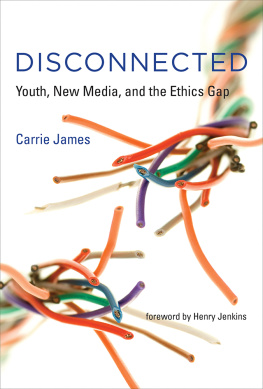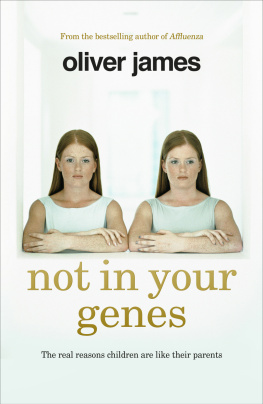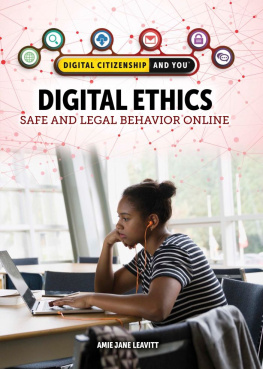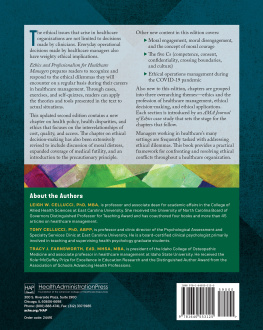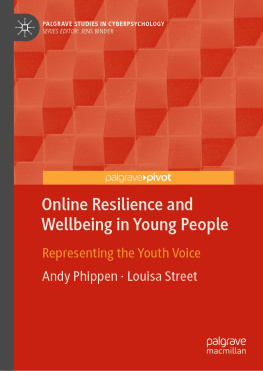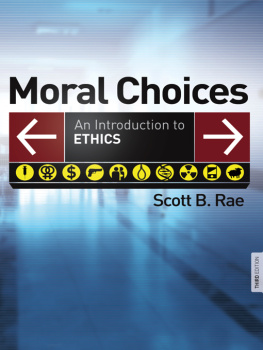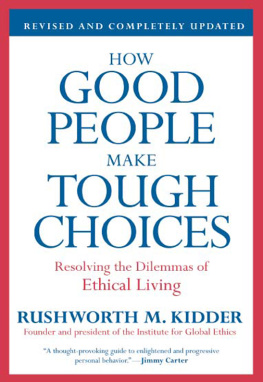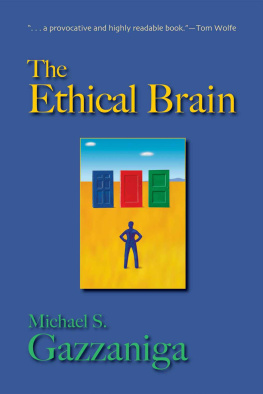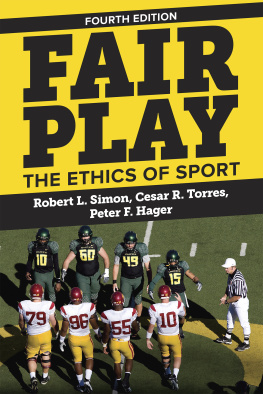James - Disconnected: youth, new media, and the ethics gap
Here you can read online James - Disconnected: youth, new media, and the ethics gap full text of the book (entire story) in english for free. Download pdf and epub, get meaning, cover and reviews about this ebook. City: Cambridge;Massachusetts;London;England, year: 2016;2014, publisher: The MIT Press, genre: Politics. Description of the work, (preface) as well as reviews are available. Best literature library LitArk.com created for fans of good reading and offers a wide selection of genres:
Romance novel
Science fiction
Adventure
Detective
Science
History
Home and family
Prose
Art
Politics
Computer
Non-fiction
Religion
Business
Children
Humor
Choose a favorite category and find really read worthwhile books. Enjoy immersion in the world of imagination, feel the emotions of the characters or learn something new for yourself, make an fascinating discovery.
Disconnected: youth, new media, and the ethics gap: summary, description and annotation
We offer to read an annotation, description, summary or preface (depends on what the author of the book "Disconnected: youth, new media, and the ethics gap" wrote himself). If you haven't found the necessary information about the book — write in the comments, we will try to find it.
How young people think about the moral and ethical dilemmas they encounter when they share and use online content and participate in online communities.
Disconnected: youth, new media, and the ethics gap — read online for free the complete book (whole text) full work
Below is the text of the book, divided by pages. System saving the place of the last page read, allows you to conveniently read the book "Disconnected: youth, new media, and the ethics gap" online for free, without having to search again every time where you left off. Put a bookmark, and you can go to the page where you finished reading at any time.
Font size:
Interval:
Bookmark:
Disconnected
The John D. and Catherine T. MacArthur Foundation Series on Digital Media and Learning
Engineering Play: A Cultural History of Childrens Software, by Mizuko Ito
Hanging Out, Messing Around, and Geeking Out: Kids Living and Learning with New Media, by Mizuko Ito, Sonja Baumer, Matteo Bittanti, danah boyd, Rachel Cody, Becky Herr-Stephenson, Heather A. Horst, Patricia G. Lange, Dilan Mahendran, Katynka Martnez, C. J. Pascoe, Dan Perkel, Laura Robinson, Christo Sims, and Lisa Tripp, with contributions by Judd Antin, Megan Finn, Arthur Law, Annie Manion, Sarai Mitnick, David Schlossberg, and Sarita Yardi
The Civic Web: Young People, the Internet, and Civic Participation, by Shakuntala Banaji and David Buckingham
Connected Play: Tweens in a Virtual World, by Yasmin B. Kafai and Deborah A. Fields
The Digital Youth Network: Cultivating New Media Citizenship in Urban Communities, edited by Brigid Barron, Kimberley Gomez, Nichole Pinkard, and Caitlin K. Martin
Connected Code: Children as the Programmers, Designers, and Makers for the 21st Century, by Yasmin B. Kafai and Quinn Burke
Disconnected: Youth, New Media, and the Ethics Gap, by Carrie James
The Interconnections Collection: Understanding Systems through Digital Design, developed by Kylie Peppler, Melissa Gresalfi, Katie Salen Tekinba, and Rafi Santo
Gaming the System: Designing with Gamestar Mechanic, by Katie Salen Tekinba, Melissa Gresalfi, Kylie Peppler, and Rafi Santo
Script Changers: Digital Storytelling with Scratch, by Kylie Peppler, Rafi Santo, Melissa Gresalfi, and Katie Salen Tekinba
Short Circuits: Crafting E-Puppets with DIY Electronics, by Kylie Peppler, Katie Salen Tekinba, Melissa Gresalfi, and Rafi Santo
Soft Circuits: Crafting E-Fashion with DIY Electronics, by Kylie Peppler, Melissa Gresalfi, Katie Salen Tekinba, and Rafi Santo
Inaugural Series Volumes
Six edited volumes were created through an interactive community review process and published online and in print in December 2007. They are the precursors to the peer-reviewed monographs in the series. For more information on these volumes, visit http://mitpress.mit.edu/books/series/john-d-and-catherine-t-macarthur-foundation-series-digital-media-and-learning.
Disconnected
Youth, New Media, and the Ethics Gap
Carrie James
The MIT Press
Cambridge, Massachusetts
London, England
2014 Massachusetts Institute of Technology
All rights reserved. No part of this book may be reproduced in any form by any electronic or mechanical means (including photocopying, recording, or information storage and retrieval) without permission in writing from the publisher.
Library of Congress Cataloging-in-Publication Data
James, Carrie.
Disconnected : youth, new media, and the ethics gap / Carrie James.
p. cm (The John D. and Catherine T. Macarthur Foundation series on digital media and learning)
Includes bibliographical references and index.
ISBN 978-0-262-02806-6 (hardcover : alk. paper)
ISBN 978-0-262-32557-8 (retail e-book)
1. Internet and youth. 2. InternetMoral and ethical aspects. 3. Parental influences. I. Title.
HQ799.9.I58J36 2014
004.6780835dc23
2014003873
10 9 8 7 6 5 4 3 2 1
For Ella and Talia, my young digital citizens
Every technology is both a burden and a blessing; not either-or, but this-and-that.
Neil Postman
Technology celebrates connectedness but encourages retreat. The flow of water carves rock, a little bit at a time. And our personhood is carved, too, by the flow of our habits. The more distracted we become, and the more emphasis we place on speed at the expense of depth, the less likely and able we are to care.
We often use technology to save time, but increasingly, it either takes the saved time along with it or makes the saved time less present, intimate, and rich. I worry that the closer the world gets to our fingertips, the farther it gets from our hearts. Its not an either/orbeing anti-technology is perhaps the only thing more foolish than being unquestioningly pro-technologybut a question of balance that our lives hang upon.
Jonathan Safran Foer
Series Foreword
In recent years, digital media and networks have become embedded in our everyday lives and are part of broad-based changes in how we engage in knowledge production, communication, and creative expression. Unlike in the early years of the development of computers and computer-based media, digital media are now commonplace and pervasive, having been taken up by a wide range of individuals and institutions in all walks of life. Digital media have escaped the boundaries of professional and formal practice and of the academic, governmental, and industry homes that initially fostered their development. Now they have been taken up by diverse populations and in noninstitutionalized practices, including the peer activities of youth. Although the specific forms of technology uptake are highly diverse, a generation is growing up in an era when digital media are part of the taken-for-granted social and cultural fabric of learning, play, and social communication.
This book series is founded on the working hypothesis that those immersed in new digital tools and networks are engaged in an unprecedented exploration of language, games, social interaction, problem solving, and self-directed activity that leads to diverse forms of learning. These diverse forms of learning are reflected in expressions of identity, in how individuals express independence and creativity, and in their ability to learn, exercise judgment, and think systematically.
The defining frame for this series is not a particular theoretical or disciplinary approach, nor is it a fixed set of topics. Rather, the series revolves around a constellation of topics investigated from multiple disciplinary and practical frames. The series as a whole looks at the relation among youth, learning, and digital media, but each contribution to the series might deal with only a subset of this constellation. Erecting strict topical boundaries would exclude some of the most important work in the field. For example, restricting the content of the series only to people of a certain age would mean artificially reifying an age boundary when the phenomenon demands otherwise. This would become particularly problematic with new forms of online participation in which an important outcome is the mixing of participants of different ages. The same goes for digital media, which are increasingly inseparable from analog and earlier media forms.
This series responds to certain changes in our media ecology that have important implications for learning. Specifically, these changes involve new forms of media literacy and developments in the modes of media participation. Digital media are part of a convergence between interactive media (most notably gaming), online networks, and existing media forms. Navigating this media ecology involves a palette of literacies that are being defined through practice but that require more scholarly scrutiny before they can be fully incorporated into educational initiatives. Media literacy involves not only ways of understanding, interpreting, and critiquing media but also the means for creative and social expression, online search and navigation, and a host of new technical skills. The potential gap in literacies and participation skills creates new challenges for educators who struggle to bridge media engagement inside and outside the classroom.
The John D. and Catherine T. MacArthur Foundation Series on Digital Media and Learning, published by the MIT Press, aims to close these gaps and provide innovative ways of thinking about and using new forms of knowledge production, communication, and creative expression.
Next pageFont size:
Interval:
Bookmark:
Similar books «Disconnected: youth, new media, and the ethics gap»
Look at similar books to Disconnected: youth, new media, and the ethics gap. We have selected literature similar in name and meaning in the hope of providing readers with more options to find new, interesting, not yet read works.
Discussion, reviews of the book Disconnected: youth, new media, and the ethics gap and just readers' own opinions. Leave your comments, write what you think about the work, its meaning or the main characters. Specify what exactly you liked and what you didn't like, and why you think so.

